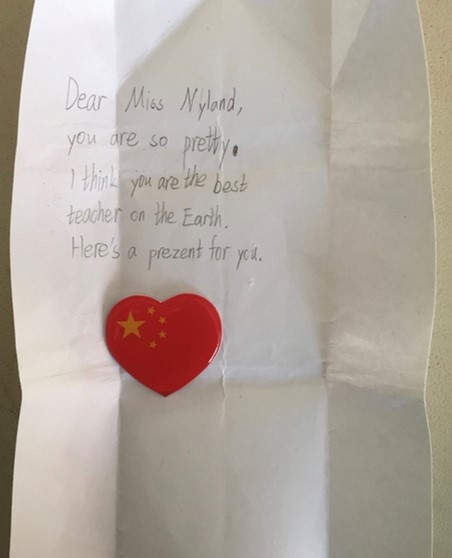By Erin Nyland, Teacher in Shanghai 2018-19
I have been living in China for 3 months now, which means that I am one quarter of my way through my long-term placement. Never did I consider how much I would learn or understand from living in this country in such a short space of time.
It’s taken a while to adjust to the culture change – that includes the dramatic change of lifestyle in comparison to what being back in England had presented. Here are some of the most significant changes in my lifestyle that I have experienced and things that I have learnt so far.
1. Food
 One substantial change already is that food is considerably cheaper compared to what it is back at home. In fact, it has been so cheap that I can easily live off the equivalent of £3 a day which, funnily enough, is the price for what I would have paid for a lunch deal during my time at university.
One substantial change already is that food is considerably cheaper compared to what it is back at home. In fact, it has been so cheap that I can easily live off the equivalent of £3 a day which, funnily enough, is the price for what I would have paid for a lunch deal during my time at university.
On my journey to school in the mornings there are street food vendors where I fight for my place in the line of a queue to get a type of breakfast called “jianbing” (煎饼), a nutritious breakfast which costs as little as 50p. My lunches are free, provided by the school that I teach at, and then for dinner I can eat for the equivalent of £1.50 – £2.50.
Moving to China has given me the opportunity to experience a countless number of new types of foods – some that I have been open to try, and some I have said an adamant goodbye to.
Stinky tofu is a type of street food in China that is confronted with scepticism (which you can probably already guess the reason why). The potent smell of the tofu being cooked can be smelt within a 5-metre radius. However, it was on the list of foods that I wanted to try and despite the terrible smell, it’s surprisingly quite tasty.
2. Health
 Keeping active has always been a priority to me, and I was apprehensive about how I would join a gym without knowing how to communicate in Chinese. First, when I went to sign up for the gym, I lingered outside looking around and reading helplessly at the gym membership options written in Chinese, until the personal trainer approached me and took me straight to another gym member inside, who was fluent in English. He then acted as my translator between me and the personal trainer to help me sign up for the gym. This is a solid example of how helpful and friendly Chinese people are.
Keeping active has always been a priority to me, and I was apprehensive about how I would join a gym without knowing how to communicate in Chinese. First, when I went to sign up for the gym, I lingered outside looking around and reading helplessly at the gym membership options written in Chinese, until the personal trainer approached me and took me straight to another gym member inside, who was fluent in English. He then acted as my translator between me and the personal trainer to help me sign up for the gym. This is a solid example of how helpful and friendly Chinese people are.
My gym membership also gives me the opportunity to sign up for Zumba and hip-hop dance classes frequently. Although I may not understand a word of what is being said 99% of the time (that 1% I understand would be the instructor counting 5,6,7,8 in Chinese), this surprisingly makes working out even more fun. I’m thrown into a completely new environment where I am the only Western person dancing in the room. Keeping fit out here has never been so entertaining.
3. Teaching
Whilst I’ve spoken about a lot of happy moments, there are also negative aspects of teaching in China too, just like every light has its shadow. It’s natural to have bad days and to wake up not feeling 100%. For this reason, I’ve found it particularly hard maintaining enthusiasm whilst teaching younger students who are charged with so much energy all the time.
When I first started teaching back in September, I would leave the house at 6.30am without a jacket, and walk to the bus stop whilst the sun had already risen. Teaching was all so new to me and the students were constantly engaged in the lessons.
Now, I can feel the temperature is dropping slowly. The mornings are getting darker, and I’ve experienced some gloomy, rainy and cold days that have taken a turn on my mood. One month into teaching and the students started to become much more relaxed with me, and soon they understood that I wasn’t at a high level of authority compared to the other Chinese teachers, causing them to sometimes misbehave in class. The agreement among every foreign teacher is that we want to (and need to) keep our lessons fun and engaging for the students, otherwise they’ll soon find the lessons tedious. For this reason, it’s hard to come up with creative ways of learning English frequently and to try and keep the lessons enjoyable for the students.
 However, the job teaching itself can always make me happier. No matter how bad or homesick I feel when I wake up, the moment I walk into school and I’m greeted with lots of beaming faces shouting my name is enough to lift my mood and make me feel appreciated.
However, the job teaching itself can always make me happier. No matter how bad or homesick I feel when I wake up, the moment I walk into school and I’m greeted with lots of beaming faces shouting my name is enough to lift my mood and make me feel appreciated.
Even more, the teachers at my school are so welcoming and incredibly giving too – they give me different types of Chinese fruit to try, and they even leave presents on my desk sometimes.
The children themselves will never fail to make me laugh during class. I always ask the children how they are feeling before the lesson starts. On one occasion, a student replied “I am not so good” and when I asked why, the student told me that they had “lost their umbrella” – which surprised me because I didn’t realise my grade 2 student could form that sentence in English.
Having said that, as days go by their intelligence continuously surprises me. My grade 4 class full of 9 year olds knew what a C.E.O meant – one student referring to the person with the job title as “the big, big boss”. I was totally amazed that they knew what the job title was, let alone how to explain it in English. It put me massively to shame too. I wish I was joking when I tell you that I was around 16/17 years old when I learnt what a C.E.O meant.
More so, if I’m not feeling 100%, there is always that one student in every class that makes my lesson worthwhile – the student who tells everyone to be quiet when I’m talking, or that personally comes up to me to say hello before class starts, and then helps me clean up the classroom when class ends.
I am also incredibly lucky to have made such a close circle of friends in Shanghai. If any of us feel stuck on what to prepare, or if we are running out of ideas, we all have each other to fall back on and we will help each other with tips and advice on lesson plans, which can be massively helpful and supportive.
4. Travel
 Another contrasting difference between China and England is that the Chinese government can order public day of rests. For example, last week was the international import expo in Shanghai. Because of this, all teachers had to work on a Saturday, but then the following Sunday, Monday and Tuesday were public days of rest. When opportunities like these arise, it’s the perfect time to hop onto a train and get the most out of exploring China. So, myself and Elise (another Teach English In China teacher) took a trip to one of Shanghai’s neighbouring cities – Nanjing. At this time of year, it’s particularly beautiful because the colours of autumn are blossoming on the trees which made the cable car journey up Purple Mountain a scenic one.
Another contrasting difference between China and England is that the Chinese government can order public day of rests. For example, last week was the international import expo in Shanghai. Because of this, all teachers had to work on a Saturday, but then the following Sunday, Monday and Tuesday were public days of rest. When opportunities like these arise, it’s the perfect time to hop onto a train and get the most out of exploring China. So, myself and Elise (another Teach English In China teacher) took a trip to one of Shanghai’s neighbouring cities – Nanjing. At this time of year, it’s particularly beautiful because the colours of autumn are blossoming on the trees which made the cable car journey up Purple Mountain a scenic one.
On one evening, we visited Confucius Temple, where a Chinese guy stopped to introduce himself to us, intrigued to know where we were from. He made me read each sign description in English to him inside the temple, and he then read it back in Chinese. Afterwards, he took us out for a meal with his friends, which turned out to be such a fun night – we leant Chinese words such as “gānbēi” (cheers), and we even tried chicken feet (!?). Despite the unappetizing taste, I did find out that it is supposedly good for the skin (trying to justify myself here).
5. Opportunities
What has surprised me the most is the opportunities that have risen since living here. In Shanghai, whatever your interest may be, you can be sure to find the need to fulfil it. Whether you are into yoga, meditation, sports or the arts, there are regular meet ups that you can join and meet like-minded people. For me, I particularly like the art scene in Shanghai, so taking my SLR camera out to take photos of the everyday and visiting art exhibitions are some of the things that I like to do in my spare time.
Having said that, just recently our education school that employed the foreign teachers in Shanghai held a photography competition with cash prizes which was a great opportunity to take part in. There has also been the opportunity to learn mandarin for free, which our education school provides free classes for once a week.
Amongst all the hustle and bustle of the city, the beeping from cars and electric bikes, the pushing and shoving, the jam-packed metros and buses – I feel like I have adjusted quickly, and I can confidently say that I am enjoying every aspect of life out here, even though it’s significantly different to my life back at home. Indeed, there have been moments that have irritated me. For example, cars driving whilst it’s a red light, cars beeping at me to move off the road when I have every right of way and people pushing to the front of the queue when I was quite obviously the next in line. I was warned of a culture shock phase; however, these trivial moments are the making of me and I’ve realised that these problems don’t irritate me as much as they did before. If anything, it has made me come to realise and value how Chinese people deal with it so patiently, causing no conflicts between one another.
But the most fascinating opportunity for me has been to learn about Chinese culture. Being able to experience a whole new different way of life that is contrastingly so different to being back at home. Even so, making new friends, not only the foreign teachers from around England, but Chinese friends too. Living a whole new lifestyle out here and surrounding myself in a new culture where I’ve met Chinese friends who have been happy to teach me about Chinese culture, which has been incredibly refreshing and eye-opening, and more so, different to anything than I would have experienced back at home.


Leave A Comment
You must be logged in to post a comment.